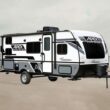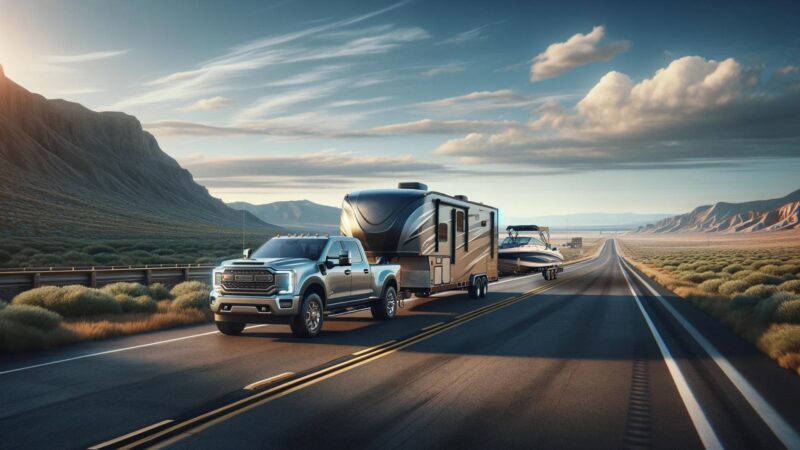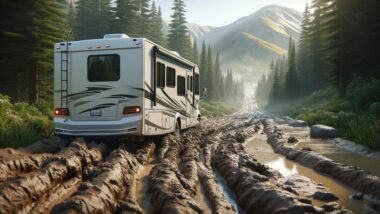Table of Contents Show
Have you ever passed a truck towing a fifth wheel that’s towing a trailer with a boat? Or maybe you’ve seen someone towing a travel trailer that’s towing a second trailer with a golf cart or ATV? This is called triple towing.
Knowing the triple towing laws in your state of residence and the states you’re traveling through is very important because this type of towing is not legal across the country.
In addition, if you’re considering triple towing, you must take proper steps to do so safely – for your and other drivers’ sake. Let’s take a closer look!
What Is Triple Towing?
Triple towing with an RV is when you tow a fifth wheel or travel trailer behind your tow vehicle and then tow something else behind that. Some people tow a smaller trailer or boat behind their RV.
It’s called triple towing because here are three pieces to your setup: the vehicle, the RV, and whatever else you tow.
If it sounds wild, it’s because it kind of is. And for this reason, there are triple towing laws in many states. Some states don’t allow it at all, and in others, there are specific regulations you have to follow.
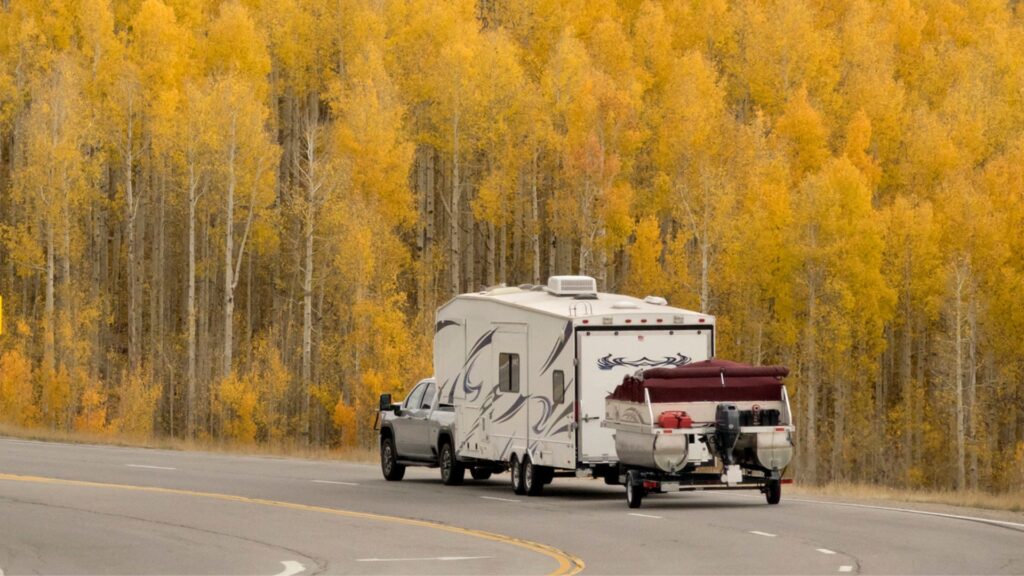
Is Triple Towing Dangerous?
Triple towing is dangerous, which is why many states don’t allow it. But even if you live in a state that permits triple towing, you must know what you’re doing to keep you and others on the road safe.
You have very little control over the third vehicle. If you’ve ever felt your trailer sway and worried about getting it under control, imagine that feeling with a third vehicle in tow.
You can also max out your towing capacity when triple towing, which can be dangerous. If your Ford F350 has a towing capacity of 14,000 pounds, and your fifth wheel is 12,500 pounds, that doesn’t leave much towing capacity for a third vehicle.
The more weight you add, the more stopping distance you’ll also need. It’s already hard enough to stop quickly when towing an RV. It becomes much more challenging when towing a third vehicle because of the added weight.
Pro Tip: If you’re not familiar with all the weight terminology in the RV world, you need to read What Does GVWR Mean and Other Weight Terms You Should Know.
Triple Towing Laws Vary By State
Some states have triple towing laws that prevent you from triple towing entirely or which implement restrictions that you need to follow.
Before you leave for a trip, check the regulations on your state’s Department of Transportation website. Also, check the triple towing laws of any states you pass through.
Some states limit the total length or weight. Some stipulate what the extra tow vehicle can be. Ensure you do your homework and follow all local regulations to avoid breaking any laws.
The following states allow triple towing, but regulations vary:
- Alaska, Arizona, Arkansas, California, Colorado, Idaho, Illinois, Indiana, Iowa, Kansas, Kentucky, Louisiana, Maryland, Michigan, Minnesota, Mississippi, Missouri, Montana, Nebraska, Nevada, New Mexico, North Dakota, Ohio, Oklahoma, South Dakota, Tennessee, Texas, Utah
All other states prohibit triple towing, so plan accordingly!
What Is the Difference Between Double Towing and Triple Towing?
Triple towing is also called double towing. But it generally refers to commercial vehicles instead of recreational vehicles. When commercial drivers haul two trailers, it’s called “hauling doubles” or “double towing.”
Some people may refer to triple towing as double towing, even with recreational vehicles. It’s the same thing since you’re hauling two vehicles simultaneously with one truck.
However, commercial drivers will receive a special education to tow two trailers, whereas an RVer can triple tow without any instruction.
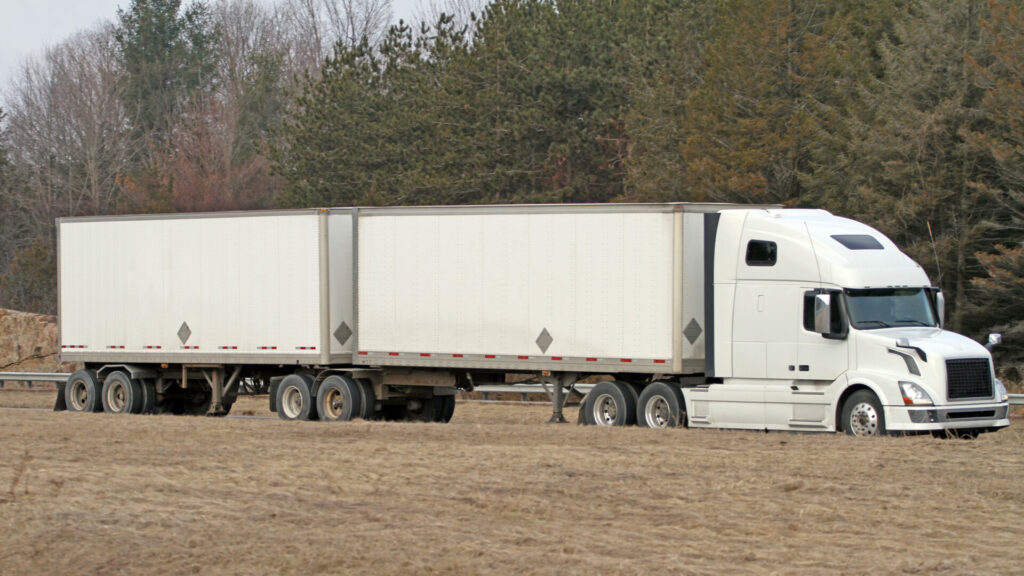
Do You Need A Special License For Triple Towing?
Just like the laws for triple towing vary by state, so do the license requirements. You’ll need to check with the DMV of your state of residence to find out if you need a special endorsement.
Although commercial drivers will need a special endorsement, RVers in most states don’t.
You’ll need to not only pay attention to whether or not triple towing is allowed and if you need a special endorsement, but you’ll also need to read the maximum length of the combination.
For example, Indiana permits triple towing up to 65 feet in length. But if you enter Illinois, although triple towing is allowed, the maximum length is 60 feet.
Learn More: Triple towing isn’t the only additional license you might need. Read Do You Need a Special License to Drive an RV?
Things To Consider Before Triple Towing
Before you think about triple towing, you need to consider various factors. For example, are your combined weight and towing capacity within safe and reasonable limits? If they aren’t, you put yourself and others at risk.
You should also consider your driving experience. Especially your experience with towing an RV. If you are new to driving an RV, jumping right into triple towing is not recommended. You would be better off gaining experience towing one thing at a time before jumping into triple towing.
Also, make sure you check with your insurance company beforehand. Some do not allow this. If you were to get in a wreck because of triple towing, you might be covered if your insurance has rules against it.

Safety Concerns For Triple Towing
The longer your rig, the more the risk. With your added length, you will have a more challenging time merging, turning, and driving in traffic. Just because there are no triple towing laws in your state doesn’t mean it is necessarily a good idea.
When triple towing, you will also have increased weight, which means stopping and starting will be more of a challenge. You must also be extremely vigilant when turning to ensure you don’t clip anything.
Cons Of RV Triple Towing
While triple towing can be a suitable solution for bringing your big toys along on your trip, there are some cons. For example, following all the triple towing laws can be hard since they vary so much by state. It puts a damper on your trip to get ticketed because you misunderstood the rules.
Not only do different states have different laws, but they also have different terminology. Some places call it triple towing, others double towing. As mentioned above, commercial trucking terminology refers to it as hauling doubles.
Another con of triple towing is that you should not triple tow in adverse weather, such as heavy rain, ice, wind, or snow. And if you stumble upon poor weather, your safety can be in jeopardy.
You also likely can’t back up your rig, at least not easily, so getting around on the road and in RV parks is more complicated. Triple towing also has a significant impact on your fuel economy.
Lastly, the mental stress of driving such a rig may outweigh the pleasure you would get from having your additional towable along.
Tips For Triple Towing
If you proceed with triple towing, below are our tips. You must take precautions and travel safely because triple towing can be dangerous if you don’t do so carefully.
Install A Backup Camera
- Easy & Quick Installation: Vision S Sharkfin Camera is an easy plug and play for pre-prepped RVs, eliminating extensive…
- Durable and intelligent camera system: Includes a High Resolution (720×480) IP65 waterproof camera with infrared night…
- 4.3″ Touch Screen Anti-glare Monitor: Comes with park assist marker lines. The windshield and table mount allow for easy…
Have a backup camera so you can see what is behind you. It’s impossible to see behind a fifth-wheel or travel trailer. If you’re going to triple tow, install a backup camera so you can pay attention to what’s going on behind you.
You don’t want to back up with a third vehicle in tow, but you do want to be able to see behind you to switch lanes on the interstate.
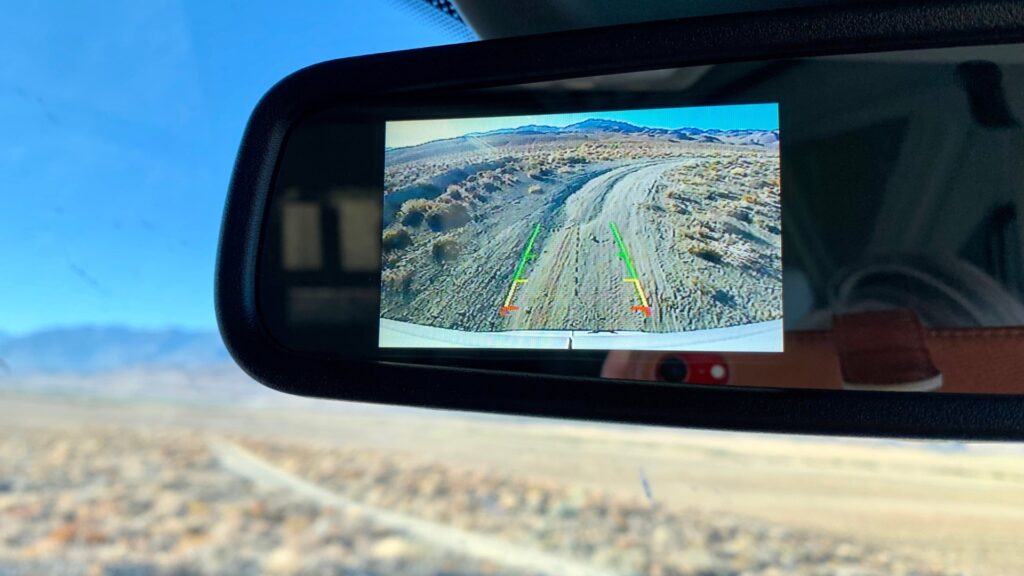
Determine Your Stress Level
Decide if the added stress of triple towing is worth it. Would you have a more enjoyable trip by leaving something behind? If a jet ski, golf cart, or ATV is that important, you’ll have to handle the added stress of triple towing.
Perhaps visiting Arizona without your ATV will be a huge disappointment. But if you’re going to Florida, you can probably leave it home.

Avoid Bad Weather
Plan ahead so you don’t have to drive in bad weather. You should already do this as an RVer, but especially if you’re triple towing.
High winds can cause swaying. Heavy rain can cause difficulty seeing. And if bad weather catches you off guard, pull over as soon as possible to wait until the conditions approve.
Consider the Added Fuel Costs
If you want to take your boat with you, consider how much fuel it will cost you to triple tow. Your fuel efficiency is already poor when towing an RV. It’s going to be even worse when towing a second vehicle. If you leave your boat at home, you might be better off renting for a few days because of the fuel savings.
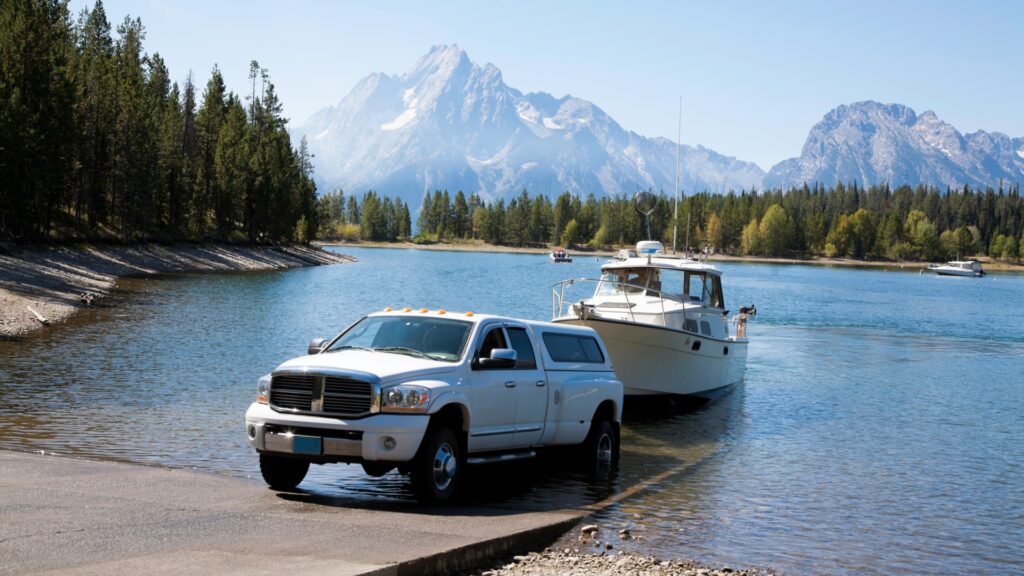
Drive Slowly and Be Alert
Always being alert may be the most crucial tip for triple towing. Be cautious and eliminate all distractions.
Ensure you leave extra time when pulling out into traffic and stopping. Don’t be in a hurry. You’ll need to drive more slowly since you’ll need more room to stop. So leave extra early, plan your stops, and arrive safely at your destination.
Consider the Triple Towing Laws In Each State As You Travel
If you tow an RV and want to bring along your boat or motorcycle, it’s not out of the question. But it does require careful driving and knowledge of triple towing laws.
So stay up-to-date about triple towing laws in each state. Otherwise, your camping trip may be unnecessarily interrupted. Do you know the triple towing laws in your state of residence?
Last update on 2024-10-21 / Affiliate links / Images from Amazon Product Advertising API


